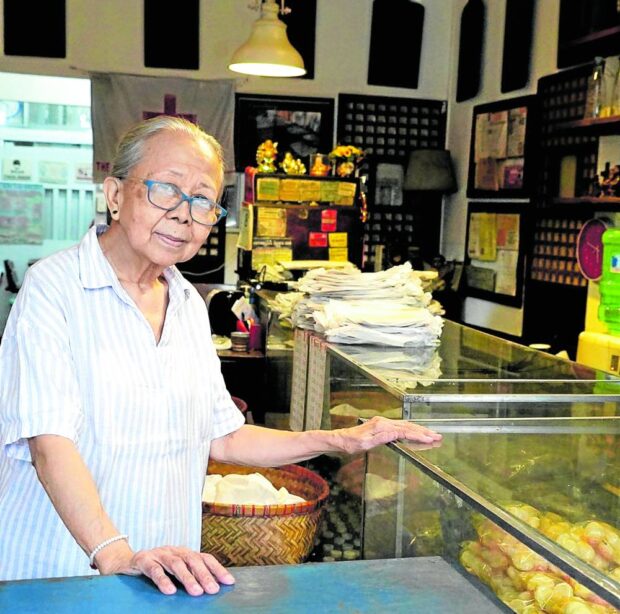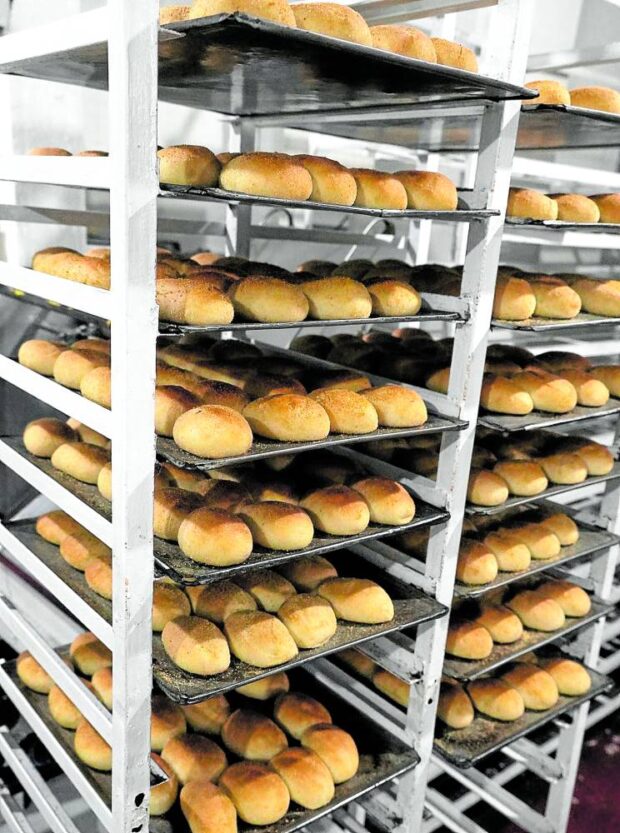Experience ‘Old Dagupan’ in this bakery
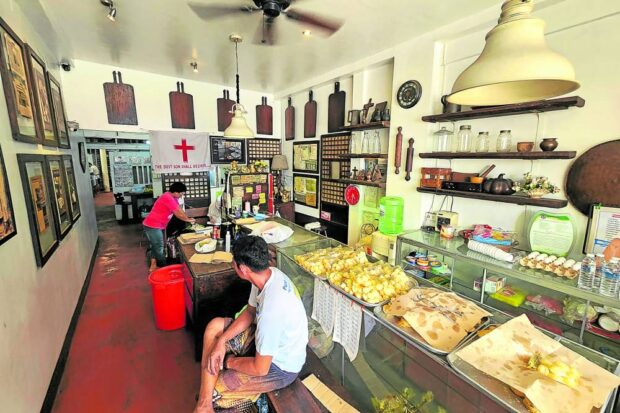
‘LUCKY’ PLACE | Sanitary Bakery has survived the 1990 earthquake and other disasters since its establishment on Aug. 13, 1947. Despite the highly competitive local market in modern times, owner Conchita Seen opted to run a simple store and decided against branching out to focus on providing quality products. (Photo by WILLIE LOMIBAO / Inquirer Northern Luzon)
DAGUPAN CITY, Pangasinan, Philippines — An old “pugon” (wood-fired oven) inside a brick and concrete chamber at the back of a 75-year-old bakery in this city, the economic hub of Pangasinan province, has withstood the test of time, narrowly surviving a magnitude 7.7 earthquake in 1990 and widespread flooding in 2009.
The shop’s owner, Conchita Seen, believes that the pugon is the bakery’s secret in producing tasty “pan de sal,” loaf bread and varieties of pastries and cookies that make Dagupeños rise early and queue every morning.
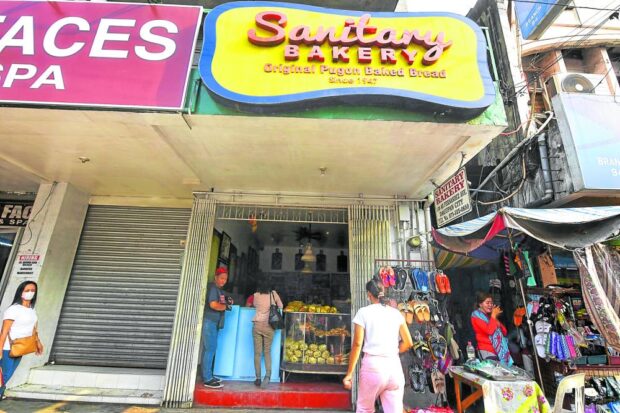
HANDS ON | Now 76 years old, Conchita Seen oversees the daily operation of Sanitary Bakery on Dagupan’s A. B. Fernandez Street, one of the city’s oldest establishments. The 75-year-old bakery, which has fed generations of Dagupeños, is witness to Dagupan’s growth as a major economic center of Pangasinan province. (Photos by RAY ZAMBRANO AND WILLIE LOMIBAO)
It was on Aug. 13, 1947, or two months after Dagupan was granted cityhood on June 30 that year, when Sanitary Bakery opened its doors on Torres Bugallon Street, which was already renamed A. B. Fernandez Street.
Surviving several natural disasters seven and a half decades later, Sanitary Bakery continues to evoke the feel and taste of “Old Dagupan,” Seen tells the Inquirer.
Its bread and other products are baked using the same family recipe used over the years. The pan de sal, its bestseller, is still packed in brown paper bags.
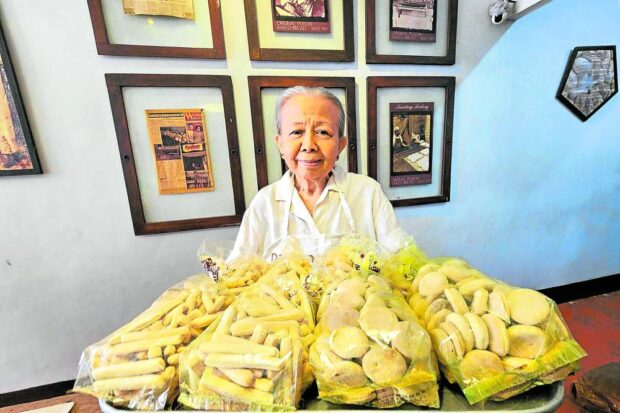
PRIDE | For Seen, the quality of Sanitary Bakery’s bread and its affordable prices are what made the store thrive for over seven decades. (Photo by WILLIE LOMIBAO / Inquirer Northern Luzon)
“I was a year old when the bakery was put up,” Seen says.
She was asked to run the bakery in 1969 since she was the only unmarried among the 12 children of Isabelo, who came from China, and Alejandra, a native of Ilocos Sur province.
Heart of business
Despite its long history, the bakery refused to compete with modern bakeries and commercial pastry chains that have sprouted in the city over the years.
“It’s the pugon that is the heart of the bakery,” Seen shares, adding that it is the same old pugon they have been using since 1952, or five years after the building where the original bakery was located was demolished.
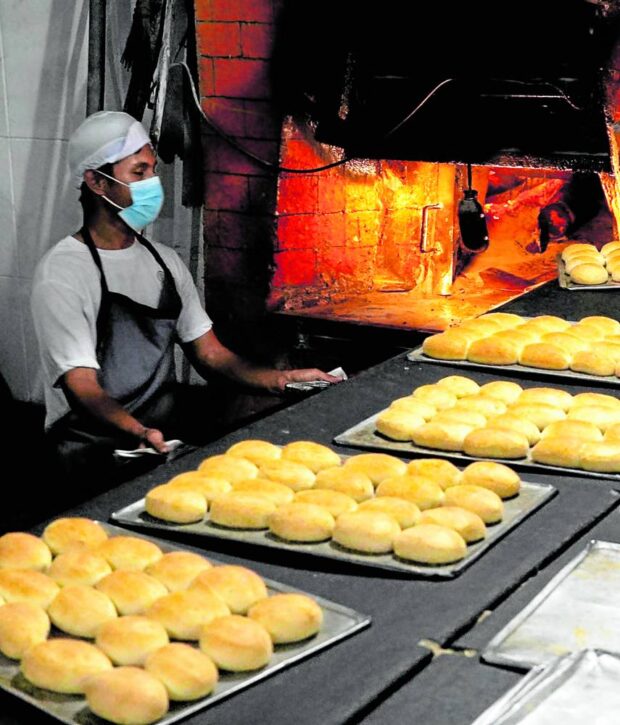
LEGACY | The bakery is being run by seven workers, with whom Seen shares her original recipes and the art of baking for sticking with her through the years. —RAY ZAMBRANO/WILLIE LOMIBAO
The family rented the building, which was later demolished by the owner, so the family transferred to the property that Isabelo bought.
“The pugon is still functional despite its age, making it historical since it is the oldest pugon in use in the city,” Seen says.
“It is simple in design as it uses only firewood for baking, but it is considered unique as it is the only one of its kind left in Dagupan where modern bake shops use electric or gas ovens,” she adds.
The building where the bakery operates is also considered a “lucky place,” Seen recalls, narrating that after the 1990 earthquake, the family transferred the operations to a property just across the road.
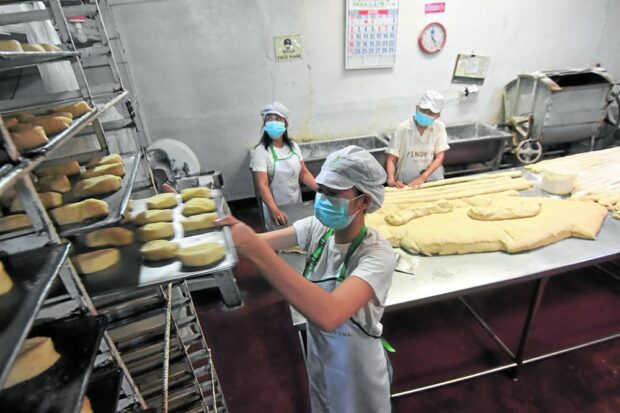
LEGACY | The bakery is being run by seven workers, with whom Seen shares her original recipes and the art of baking for sticking with her through the years. —RAY ZAMBRANO/WILLIE LOMIBAO
Simple
But the new pugon was not efficient, prompting her to return to the original location.
While Sanitary Bakery’s products are popular among Dagupeños and residents in neighboring towns, Seen chose to maintain the simple store and decided against establishing any branches.
“My siblings have other interests, and I could not manage more than one store. Besides, this bakery is able to provide for my needs,” Seen says.
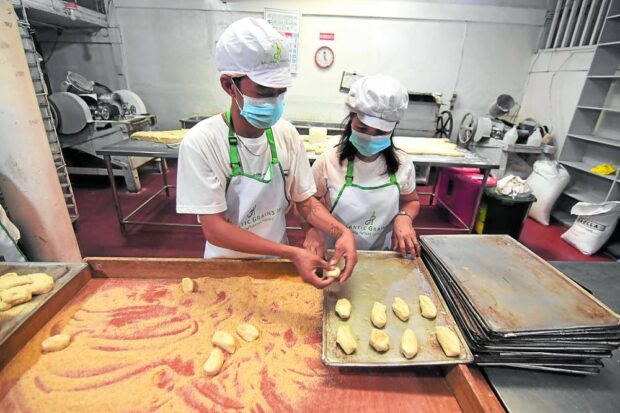
HANDS ON Now 76 years old, Conchita Seen oversees the daily operation of Sanitary Bakery on Dagupan’s A. B. Fernandez Street, one of the city’s oldest establishments. The 75-year-old bakery, which has fed generations of Dagupeños, is witness to Dagupan’s growth as a major economic center of Pangasinan province. —PHOTOS BY RAY ZAMBRANO AND WILLIE LOMIBAO
She maintains only seven staff members who stay with her at the building and with whom she unselfishly shares the art and business of baking.
“I share with them the original recipes of the breads and pastries. They have been with me through the years and it is only the knowledge and skills of baking that I could leave to them,” she says.
According to Seen, the bakery’s history dates back to the time when her father and his six Chinese friends arrived in Dagupan from China after World War II, escaping from that country’s oppressive regime.
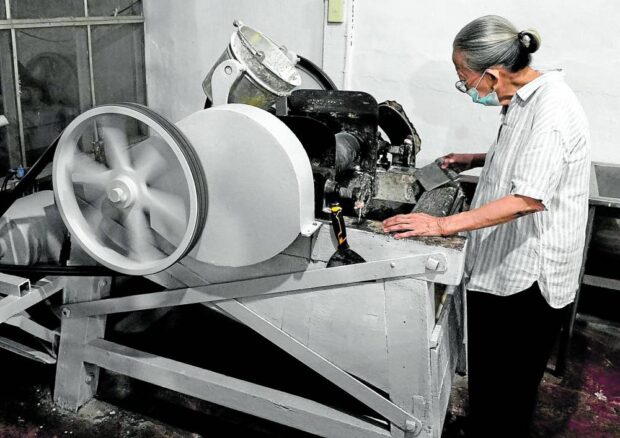
HANDS ON | Now 76 years old, Conchita Seen oversees the daily operation of Sanitary Bakery on Dagupan’s A. B. Fernandez Street, one of the city’s oldest establishments. The 75-year-old bakery, which has fed generations of Dagupeños, is witness to Dagupan’s growth as a major economic center of Pangasinan province. —RAY ZAMBRANO AND WILLIE LOMIBAO
At that time, they found the city crawling out of the destruction wrought by war.
The friends started different ventures, but later pooled their resources and started the bakery they named “Sanitary Bakery and Grocery.”
But the partnership was dissolved in 1962, and Seen’s father, Isabelo, decided to continue the operations by buying his partners’ shares.
“Some of them were opposed to my father being left with the bakery. One of them, who had the biggest share among the partners, prevailed upon the others to let my father continue the operations,” Seen says.
No formal training
Isabelo had no formal training in the bakery business, but in Canton, China (now Guangzhou) where he came from, cooking and sewing were part of children’s training in school.
“My father had a baking book given to him by a British man, and he changed some ingredients to suit the Filipino taste,” Seen says.
Her father, whose real name is Seen Seaw, adopted the name Isabelo when he married Alejandra, an Ilocana from Candon City in Ilocos Sur.
Seen recalls stopping school for a year so her father could save enough money to purchase the bakery.
“Those were difficult times, and I always cried then. My classmates were already going to college, and there I was, helping in the bakery. But I have realized the value of my sacrifice,” she says.
From 1960 to 1968, the siblings’ eldest, Jesus, managed the bakery until Seen took over in 1969. Their mother manned the cash register until her death in 2016.
Seen still operates the bakery, which was the wish of her father, who died in 2007.
Saying old age may force her to give up operating the bakery, Seen hopes that whoever takes over from the family will maintain the “Old Dagupan feel” of the bakery, the quality of the products and the affordable prices.
A small pan de sal sells for P3 each, slightly up from P2.50 before the pandemic. The bigger pan de sal costs P6, while loaf bread or “pan de bara” sells for P60.
Sadly, no one in the family has shown interest in taking over just yet, Seen laments.
In December last year, Pangasinan Rep. Christopher de Venecia visited Sanitary Bakery and proposed the installation of a historical marker for the pugon that has fed generations of Dagupeños.
